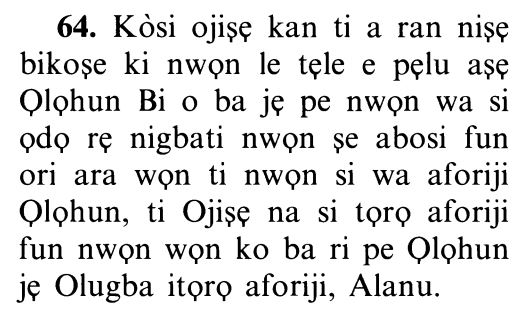4vs64
Select any filter and click on Go! to see results
وَمَا أَرْسَلْنَا مِن رَّسُولٍ إِلاَّ لِيُطَاعَ بِإِذْنِ اللّهِ وَلَوْ أَنَّهُمْ إِذ ظَّلَمُواْ أَنفُسَهُمْ جَآؤُوكَ فَاسْتَغْفَرُواْ اللّهَ وَاسْتَغْفَرَ لَهُمُ الرَّسُولُ لَوَجَدُواْ اللّهَ تَوَّاباً رَّحِيماً
Wama arsalna min rasoolin illa liyutaAAa biithni Allahi walaw annahum ith thalamoo anfusahum jaooka faistaghfaroo Allaha waistaghfara lahumu alrrasoolu lawajadoo Allaha tawwaban raheeman
Click to play
Yoruba Translation

Hausa Translation
Kuma ba Mu aiki wani Manzo ba fãce dõmin a yi masa ɗã´a da izinin Allah. Kuma dã dai lalle sũ a lõkacin da suka zãlunci kansu,(3) sun zo maka sa´an nan suka nħmi gãfarar Allah kuma Manzo ya nħma musu gãfara, haƙĩƙa, dã sun sãmi Allah Mai karɓar tũba Mai jin ƙai.
Asbabu n-Nuzuul (Occasions of Revelation)
The Necessity of Obeying the Messenger
Allah said,
وَمَا أَرْسَلْنَا مِن رَّسُولٍ إِلاَّ لِيُطَاعَ ...
We sent no Messenger, but to be obeyed,
meaning, obeying the Prophet was ordained for those to whom Allah sends the Prophet.
Allah's statement,
... بِإِذْنِ اللّهِ ...
by Allah's leave,
According to Mujahid, means,
"None shall obey, except by My leave,''
This Ayah indicates that the Prophets are only obeyed by whomever Allah directs to obedience.
In another Ayah, Allah said,
وَلَقَدْ صَدَقَكُمُ اللَّهُ وَعْدَهُ إِذْ تَحُسُّونَهُمْ بِإِذْنِهِ
And Allah did indeed fulfill His promise to you when you were killing them (your enemy) with His permission. (3:152)
meaning, by His command, decree, will and because He granted you superiority over them.
Allah's statement,
... وَلَوْ أَنَّهُمْ إِذ ظَّلَمُواْ أَنفُسَهُمْ جَآؤُوكَ فَاسْتَغْفَرُواْ اللّهَ وَاسْتَغْفَرَ لَهُمُ الرَّسُولُ ...
If they (hypocrites), when they had been unjust to themselves, had come to you and begged Allah's forgiveness, and the Messenger had begged forgiveness for them,
directs the sinners and evildoers, when they commit errors and mistakes, to come to the Messenger, so that they ask Allah for forgiveness in his presence and ask him to supplicate to Allah to forgive them. If they do this, Allah will forgive them and award them His mercy and pardon.
This is why Allah said,
... لَوَجَدُواْ اللّهَ تَوَّابًا رَّحِيمًا ﴿٦٤﴾
indeed, they would have found Allah All-Forgiving (One Who forgives and accepts repentance), Most Merciful.
يقول تعالى " وما أرسلنا من رسول إلا ليطاع " أي فرضت طاعته على من أرسل إليهم وقوله " بإذن الله " قال مجاهد : أي لا يطيع أحد إلا بإذني يعني لا يطيعه إلا من وفقته لذلك قوله " ولقد صدقكم الله وعده إذ تحسونهم بإذنه " أي عن أمره وقدره ومشيئته وتسليطه إياكم عليهم وقوله " ولو أنهم إذ ظلموا أنفسهم " الآية يرشد تعالى العصاة والمذنبين إذا وقع منهم الخطأ والعصيان أن يأتوا إلى الرسول صلى الله عليه وسلم فيستغفروا الله عنده ويسألوه أن يستغفر لهم فإنهم إذا فعلوا ذلك تاب الله عليهم ورحمهم وغفر لهم ولهذا قال " لوجدوا الله توابا رحيما " وقد ذكر جماعة منهم الشيخ أبو منصور الصباغ في كتابه الشامل الحكاية المشهورة عن العتبي قال : كنت جالسا عند قبر النبي صلى الله عليه وسلم فجاء أعرابي فقال : السلام عليك يا رسول الله سمعت الله يقول " ولو أنهم إذ ظلموا أنفسهم جاءوك فاستغفروا الله واستغفر لهم الرسول لوجدوا الله توابا رحيما " وقد جئتك مستغفرا لذنبي مستشفعا بك إلى ربي ثم أنشأ يقول : يا خير من دفنت بالقاع أعظمه فطاب من طيبهن القاع والأكم نفسي الفداء لقبر أنت ساكنه فيه العفاف وفيه الجود والكرم ثم انصرف الأعرابي فغلبتني عيني فرأيت النبي صلى الله عليه وآله وسلم في النوم فقال : يا عتبي الحق الأعرابي فبشره أن الله قد غفر له " .
"وما أرسلنا من رسول إلا ليطاع" فيما يأمر به ويحكم "بإذن الله" بأمره لا ليعصى ويخالف "ولو أنهم إذ ظلموا أنفسهم" بتحاكمهم إلى الطاغوت "جاءوك" تائبين "فاستغفروا الله واستغفر لهم الرسول" فيه التفات عن الخطاب تفخيما لشأنه "لوجدوا الله توابا" عليهم "رحيما" بهم
" من " زائدة للتوكيد .
I'raab - grammatical analysis of the Qur'an
«وَما أَرْسَلْنا مِنْ رَسُولٍ» فعل ماض وفاعل ومن زائدة ورسول اسم مجرور لفظا منصوب محلا على أنه مفعول به وما نافية والجملة استئنافية.
«إِلَّا» أداة حصر.
«لِيُطاعَ» فعل مضارع منصوب بأن المضمرة بعد لام التعليل والمصدر المؤول في محل جر باللام والجار والمجرور متعلقان بأرسلنا.
«بِإِذْنِ» متعلقان بيطاع.
«اللَّهِ» لفظ الجلالة مضاف إليه.
«وَلَوْ أَنَّهُمْ» الواو استئنافية لو شرطية غير جازمة أنهم أن واسمها.
«إِذْ» ظرف بمعنى حين مبني على السكون في محل نصب متعلق بالفعل جاؤوك.
«ظَلَمُوا» فعل ماض وفاعل والجملة في محل جر بالإضافة.
«أَنْفُسَهُمْ» مفعول به. وأن وما بعدها في تأويل مصدر في محل رفع فاعل لفعل محذوف تقديره ولو صدق مجيئهم.
«جاؤُكَ» فعل ماض وفاعل ومفعول به والجملة خبر أن.
«لَوَجَدُوا اللَّهَ تَوَّاباً» فعل ماض وفاعله ومفعولاه والجملة لا محل لها جواب شرط غير جازم واللام رابطة لهذا الشرط.
«رَحِيماً» صفة.
